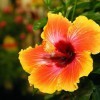Abstract
Horticultural consumers in Florida are interested in local and organically produced plants. But these terms can mean different things in different regions. UF/IFAS researchers conducted a survey last summer which suggests that consumers in central Florida define local as plants that are grown near where they are sold and identify the most important local benefits as product safety, quality, and community support. Organic plants are perceived as requiring fewer chemical additives and being healthier for the environment. The importance of these traits varies by plant type. This 5-page fact sheet was written by Hayk Khachatryan and Alicia Rihn, and published by the UF Department of Food and Resource Economics, April 2015.
FE964/FE964: Floridian Consumer Perceptions of Local Versus Organic Ornamental Plants (ufl.edu)
References
Harris, W., B. Lubben, J. Novak, and L. Sanders. 2008. The Food, Conservation, and Energy Act of 2008 summary and consequences. Extension National Farm Bill Train the Trainer Conference, Kansas City, MO.
Hawkins, G., S.E. Burnett, and L.B. Stack. 2012. Survey of consumer interest in organic, sustainable, and local container-grown plants in Maine. HortTechnology 22:817-825. https://doi.org/10.21273/HORTTECH.22.6.817
Schimmenti, E., A. Galati, V. Borsellino, C. Ievoli, C. Lupi, and S. tinervia. 2013. Behaviour of consumers of conventional and organic flowers and ornamental plants in Italy. Horticultural Science 40:162-171. https://doi.org/10.17221/115/2013-HORTSCI
USDA/AMS. 2014. National Organic Program website. United States Department of Agriculture, Agricultural Marketing Service (USDA/AMS), Washington, D.C. http://www.ams.usda.gov/AMSv1.0/nop.
USDA/ERS. 2014. Local Foods. United States Department of Agriculture, Economic Research Service (USDA/ERS), Washington, D.C. http://www.ers.usda.gov/topics/food-markets-prices/local-foods.aspx.
USDA/NASS. 2007. 2007 Census of Agriculture-Greenhouse, Nursery, and Floriculture Operations. United States Department of Agriculture, National Agricultural Statistics Service (USDA/NASS), Washington, D.C.
Yiridoe, E.K., S. Bonti-Ankomah, and R.C. Martin. 2005. Comparison of consumer perceptions and preference toward organic versus conventionally produced foods: A review and update of the literature. Renewable Agriculture and Food Systems 20:193-205. https://doi.org/10.1079/RAF2005113
Yue, C., J.H. Dennis, B.K. Behe, C.R. Hall, B. Campbell, and R.G. Lopez. 2011. Investigating consumer preference for organic, local, or sustainable plants. HortScience 46:610-615. https://doi.org/10.21273/HORTSCI.46.4.610

